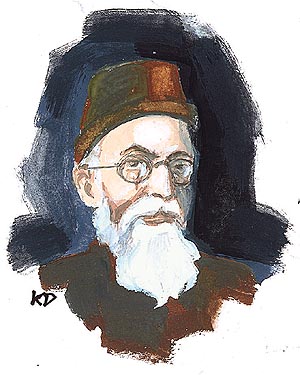LONDON 1867: a dignified bearded man reads his paper England's Debt to India to a receptive audience. He has come all the way from India to make the English aware of the oppressive policies of the British government in India. He tells them that Britain is exploiting India, that 'out of the revenues raised in India, nearly one-forth goes clean out of the country and is added to the resources of England'. He goes on to add that because of such inhumane policies, India is 'being continuously bled'.
 That was Dadabhai Naoroji, the grand old man of India, and generally accepted as the father of Indian nationalism. What can you say about the man to whom Gandhi once said: 'Please chide me if I go wrong, please put me right; I am like your son in every respect'.
That was Dadabhai Naoroji, the grand old man of India, and generally accepted as the father of Indian nationalism. What can you say about the man to whom Gandhi once said: 'Please chide me if I go wrong, please put me right; I am like your son in every respect'.
Naoroji devoted his long life to the welfare of his people, in words as well as in deed. He organised the Student's Literary and Scientific Society. He was one of the earliest advocates of women's education. He also took an active part in establishing the Bombay Association, the Framji Institute, the Irani Fund, the Parsi Gymnasium, the Widow Marriage Association, and the Victoria and Albert Museum. In 1851, he started Rast Goftar a Gujarati Weekly. Along with A.O. Hume, Pherozeshah Mehta, and W.C. Bannerjee, he founded the Indian National Congress in 1885.
A very upright gentleman of regualar habits, Naoroji was born on September 4, 1825, in Bombay. As he grew up he went to Elphinstone Institution, and was later appointed Assistant Professor of Mathematics of Natural Philosophy there. He resigned in 1856 and went to England to manage the business of Cama & Co.
In Britain he stared the London Indian Society to bring Indians and Englishmen closer. On his second visit to England he gave evidence before the Parliamentary Committee on Indian finance. He tried to bring home the point that India was being impoverished because of very high and unfair taxation. In Poverty of India he elaborated it further: 'Owing to this one unnatural policy of the British rule of ignoring India's interest and making it the drudge for the benefit of England, the whole rule moves in a wrong, unnatural suicidal groove.'
He again went toEngland in 1886 to take part in the General Elections. Contesting as a Liberal candidate from Holborn, but he lost. However he was successful in 1892. His first effort as member of Parliament was to present India's case to the British. He was instrumental in getting a resolution passed for holding simultaneous examinations in Indian and England for the Indian Civil Service.
No comments:
Post a Comment